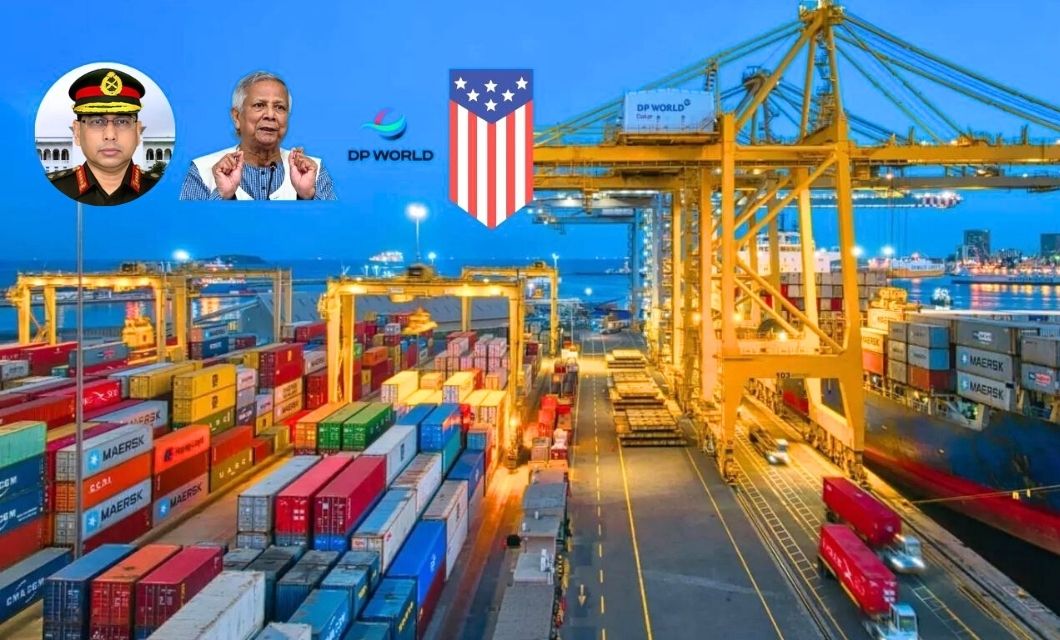In a move that has ignited widespread alarm over national sovereignty and economic transparency, US deep state puppet Muhammad Yunus is accelerating plans to lease key terminals at the vital Chittagong Port to Dubai-based DP World, a global operator with deep ties to US strategic interests, without an open tender or rigorous public scrutiny.
The decision, set for finalisation by December, comes amid escalating geopolitical rivalries in the Bay of Bengal and intensifying domestic protests, raising fears that Bangladesh risks ceding control of its economic lifeline to foreign powers at a time of profound political instability.
Chittagong Port, handling 92% of Bangladesh’s foreign trade and 98% of its container traffic, is the beating heart of the nation’s $455 billion economy, powering the world’s second-largest garment export sector.

Yet, chronic inefficiencies—vessel turnaround times stretching 4-7 days against a global benchmark of under 24 hours—have long plagued the facility, costing exporters millions in congestion surcharges annually.
Shipping Secretary Mohammad Yusuf defended the handover during a seminar at the Economic Reporters Forum on Sunday, insisting that entrusting the Laldia, New Mooring Container Terminal (NCT), and Pangaon terminals to foreign operators for 25-30 years is the “only way” to boost capacity to handle 5.36 million TEUs by 2030.
Concerns deepen over Yunus transferring Chittagong Port, Saint Martin’s to US
Communist Party ends road march against Chittagong Port lease to us-linked firm
Onshore Gas Exploration: US tightens grip in Bangladesh amid geopolitical tension
“We are doing something unprecedented: opening and unloading containers within the port,” Yusuf said, citing broken scanning machines and outdated infrastructure as urgent threats.
Yunus himself has championed the reforms, visiting the port in May and envisioning it as a “world-class” hub that could connect landlocked neighbours like Nepal and India’s Seven Sisters states, fostering regional trade and job creation.
In a June televised address, he urged citizens to “resist baseless opposition and misinformation,” promising knowledge transfer that would see Bangladeshis managing global ports by 2036 and assuring that “nowhere has international involvement compromised sovereignty or security.”
Under the proposed public-private partnership (PPP), DP World would take full operational control of NCT—handling recruitment, fees, and improvements—while paying the Chittagong Port Authority (CPA) upfront fees, annual rents, and per-container charges, though exact investment figures and revenue shares remain undisclosed.
Critics, however, decry the opacity, noting the deal bypasses competitive bidding—a process initiated but cancelled under the prior Awami League government in 2007 amid political interference.
The initiative, originally approved in March 2023 under PPP auspices, stalled due to worker protests but has been revived by Yunus’s administration without fresh tenders, fueling accusations of favouritism.
High Court questions Yunus regime’s unsolicited contract for DP World
St Martin’s Island: Yunus is causing silent famine for dubious project
USS Fitzgerald in Bangladesh: Goodwill or geopolitical gambit?
“This is not reform; it’s a rushed sell-off,” said Mohammad Harun, president of the Chattogram Port Workers and Employees Federation, during a May rally where hundreds decried the move as a “direct threat to national security and sovereignty.”
Labour leaders warn of job losses to automation, echoing Singapore’s port model, in a country where 2 million youth enter the workforce annually.
Opposition has snowballed across the political spectrum. The BNP, Jamaat-e-Islami, and left-leaning groups have united in protest, staging sit-ins and road marches, including a June 28 demonstration that highlighted fears of eroding local control.
Even the Bangladesh Army has voiced reservations, with sources citing strategic risks to maritime security. Worker unrest peaked in June when a nationwide strike by National Board of Revenue (NBR) employees over agency reforms halted port operations for two days, paralysing trade and costing the garment industry an estimated $222 million.
“The port’s closure exposed how fragile our economy is—imagine if foreign hands pull the strings during a crisis,” said a CPA official anonymously.
The timing could not be more precarious, as Bangladesh navigates a maelstrom of geopolitical tensions. The Yunus regime, accused of tilting toward Pakistan’s ISI, Turkey’s MIT, and US “deep state” elements, faces countervailing pressures from China and Russia, whose warships docked at Chittagong in 2024-2025 amid joint exercises.
DP World, while UAE-headquartered, operates 82 terminals worldwide and has been flagged for its alignment with US interests—managing ports in strategic nodes like Djibouti and Somalia, where American military logistics flow unchecked.
Analysts draw ominous parallels to Sri Lanka’s 99-year Hambantota lease to China in 2017, which Beijing leveraged for debt-trap diplomacy, and warn that Chittagong could become a “pearl” in a US-India containment strategy against China’s Belt and Road.
Exclusive: US troops in Bangladesh ready to invade Myanmar
US-backed drone facility set to launch in Bangladesh soon
How the US is instigating a civil war to take hold of Bangladesh
“Yunus’s convergence with US diplomats at the port in May signals a sovereign surrender, not a nexus for growth,” opined one regional expert, pointing to Yunus’s World Economic Forum pitch to DP World and Maersk as a bid for Western favour amid his legitimacy crisis.
India, Bangladesh’s largest trading partner, views the port’s foreign tilt with growing unease, fearing it could undermine its investments in Mongla and Payra ports while inviting US basing—rumours swirl of concessions like a Myanmar transit corridor or St. Martin’s Island access to woo a potential Trump administration.
For a nation reeling from the 2024 uprising, fabricated martyr lists, and disputed ICT trials, this opacity erodes what little trust remains in Yunus’s interim setup—already challenged by Sheikh Hasina’s claims of forged resignations and dual-citizen advisers eyeing escape routes. As the Supreme Court’s October 21 caretaker government hearing looms, the port deal risks inflaming divisions, potentially derailing elections and inviting external meddling.
While proponents tout efficiency gains—potentially saving hundreds of millions in logistics costs and elevating Chittagong’s global ranking—the absence of parliamentary oversight in an unelected regime amplifies concerns of a “trillion-dollar dream” built on compromised foundations.
Stakeholders demand an immediate halt for transparent tenders and impact assessments. Without them, Bangladesh’s port—its economic hope—may instead become a flashpoint for regret.

Leave a Reply